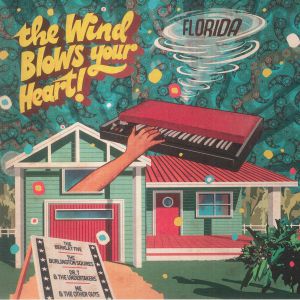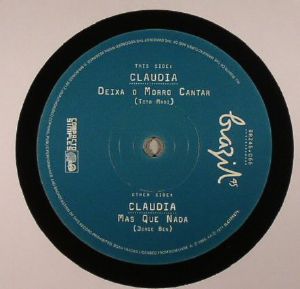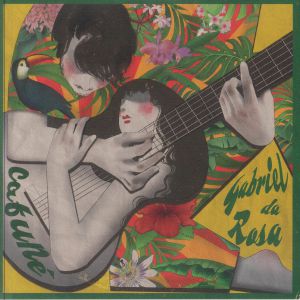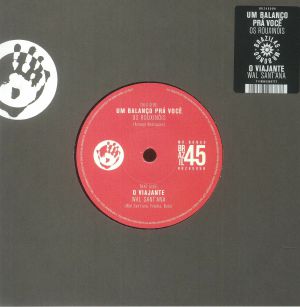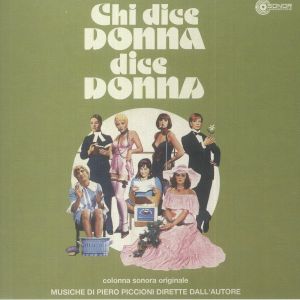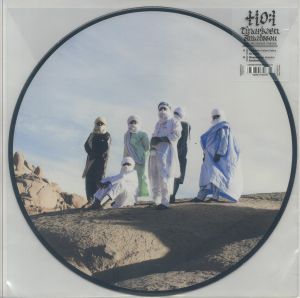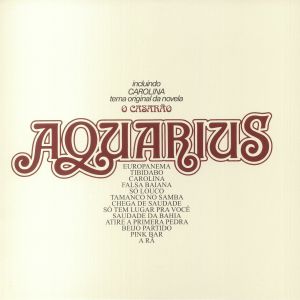Filter
Genre
Stock
Label
Featured
Release Title
Price
Tags
120
Psychedelic Rock
84
Bossa Nova
44
Brazilian
35
Brazilian Jazz
27
MPB
25
Psychedelic Funk
18
Afro Rock
18
Latin Jazz
18
Samba
17
African
14
Turkish
13
Latin
9
Arabic
9
Brazilian Funk
6
Italian
6
Japanese
6
Jazz Funk
6
Psychedelic Disco
6
Rock Disco
5
Afro Funk
5
Latin Funk
5
Psychedelic Jazz
5
Psychedelic Soul
5
Spanish
4
Cumbia
4
European Rock
4
Japanese jazz
4
Leftfield Disco
4
Middle Eastern
3
Afrobeat
Back catalogue: All genres
Juno's full catalogue of All genres
Singles
in stock ₺616,03
Intérprete: Afro Beat Foundation, I Love 45's!
in stock ₺495,57
Cat: YATC 100. Rel: 22 May 23
Psych/Garage Rock
in stock ₺638,22
Review: Mr Bongo's reliable Brazil 45s series reaches its' 85th instalment. This time round the Brighton-based label has chosen to offer up two cuts from Waldir Calmon's 1970 set Waldir Calmon E Seus Multisons. While the album is not all that renowned, the track 'Airport Love Theme' - which resides on the A-side here - most certainly is, thanks to Madlib sampling it on the Madvillain album. It's a laidback and languid fusion of mellow soul breaks, Mexican stand-off trumpets, soaring choral vocals, Mediterranean acoustic guitars and mazy organ solos, all topped off with the sugary polish often associated with classic lounge music. Over on side B there's a chance to savour another killer cut from the same set, Jean-Jacques Perrey-esque lounge funk groover 'Afro Son'.
… Read more in stock ₺495,57
Review: Brazil 45s hit the quarter century in their run and show no sign of stopping. It's an all-girl affair on this one as two hugely popular and prolific singers take a spin under Mr Bongo's spotlight. Elizabeth (often known as Elizete) lays down a steamy samba flavour that gets raunchier as the track develops. Elza, meanwhile, gets busy on a Bossa tip as a carnival of percussion and horns go toe-to-toe with her sharp, sexy staccato vocals. Powerful.
… Read more in stock ₺495,57
Review: Supreme musica popular Brasileira and bossa-nova vibes here on two tracks from Mr Bongo's leading Brazilian 45's lady, Claudia. "Deixa o Morro Cantar" features on Claudia's very first 7", released in 1965 by RGE Brazil. Her version of "Mas Que Nada" is said to be more of a jazzy/folk-funk take on the Ben classic. A relatively recent discovery made during the label's last trip to Brazil, Maria das Gracas Rallo was born in 1946 in Rio de Janeiro. She has become the most awarded singer outside of her home country and was most popular internationally in 1982 with the song "Don't Cry for Me Argentina" from the musical Evita. Moreover, she has recorded over twenty albums and has amassed huge record sales throughout her successful career.
… Read moreIntérprete: Mukatsuku Records Chart, I Love 45's!
in stock ₺462,29
Review: Progressive quartet Combo Chimbita launches their own label with a psychedelic-infused track merging dub reggae's rootsiness with cumbia's guacharo and chicha-influenced guitar. 'Margarita' and its dub counterpart 'Nene' form a lush duo that marks a new phase in Combo Chimbita's evolving sound. After honing their act from an improvisational collective to a captivating ensemble, they entered a period of introspection and experimentation and sought guidance from producer Victor Axelrod, aka Ticklah. With a focus on their Colombian roots, they fused traditional elements with reggae nuances, exploring themes of displacement and identity. This release symbolises their journey.
… Read moreIntérprete: Juno Recommends International, Tom Drew
in stock ₺781,39
Review: Blending hi-NRG and Latin cumbia, Combo Chimbita present a brand new single for Wonderwheel Recordings, 'Dimelo'. Described as an internal dialogue - a sonic representation of what it feels and sounds like to choose yourself - the refrain "Cuando por fin yo me elegi" is heard repeatedly throughout the track, as self-selection is maximised, contra the impossibility of saving others before oneself. The band's Carolina Oliveros says of the song, "however much you love someone, you can't force them to love yourself in the same way - that is love you have to give yourself." The Busy Twist remixes the idea, self-caring through salvos of oily guitar and toe-tapping woodblock shot, hitting like a health kick.
… Read moreIntérprete: Juno Recommends International
in stock ₺407,34
African Dream (blue & pink splattered vinyl 7" + insert limited to 100 copies)
Cat: DSCBOX 1 4 COLOUR. Rel: 08 Oct 24
Funk
Review: The Scepters, formed in 1967 in Paraiso by guitarist Celso Spencer, were a popular Panamanian band known for their energetic performances across military bases and high school dances in the Canal Zone. Alongside Lionel Best and Jose James, they covered Top 40 hits and iconic rock bands like Santana and Jimi Hendrix. They released two 45s, including 'Message,' which debuted at Panama's first National Soul Music Festival in 1971 and features next here to a jam from Conjunto Raza, another project led by Agustin Leiro, this one with rotating musicians. They released a single 45 on Onda Nueva in the mid-70s and it blends Zonian and Panamanian talent with aplomb.
… Read moreIntérprete: Mukatsuku Records Chart
in stock ₺990,61
in stock ₺506,14
Review: After his debut album E o que a casa oferece from 2023, Gabriel da Rosa is back with another silken bossa nova record, in homage to the musical style that raised him. 'Cafune' was first released digitally a follow-up single to the alnbum, one which rounded out the year that said debut was released, and which was written for the soundtrack to the film film All Happy Families (Haroula Rose). Now an authentic 12" version, the song is here backed by the B-side 'Sort Of', an impressive desert passage through refractive, rainbow dream pop.
… Read more in stock ₺704,26
Review: Emerging from Austin's vibrant music scene, El Combo Oscuro infuses Latin psychedelia with the mystical essence of New Orleans. Their track 'Vudu y Chachacha' marries pulsating percussion with echoing guitars and a steady bassline, creating an entrancing soundscape. On Side-1 features a remix by New Orleans' Professor Shorthair, who transforms the original into a dance-floor anthem. With Rakaa Iriscience of Dilated Peoples lending his distinctive vocals, the remix amplifies the track's infectious groove. Presented on a limited edition 45 rpm, the bone-colored vinyl with blue and violet splatter adds a visual flair to the auditory experience. Both sides of this are a fine fusion of Latin rhythms and modern beats, offering a fresh take on cross-genre innovation.
… Read moreIntérprete: The Allergies, Juno Recommends International
in stock ₺561,61
Review: Two outstanding Brazilian funk cuts straight out of 1971: "Esperar Pra Ver" is a laden with an immense orchestrated groove that's triggered by a lean, unforgettable bass guitar riff that matches Evinha's purring, slinky allure. "Que Bandeira" rolls with more of a poppy bossa flow with militant rim shots, swooning strings and a momentum that builds on every verse. Both tracks are taken from Cartao Postal, Evinha's third album that has been known to pass hands for as much as L500 in the past.
… Read more in stock ₺483,95
Review: Mahal by Glass Beams melds a diverse array of influences into a unique and enchanting soundscape. The Melbourne-based trio, shrouded in mystery with their mask-wearing anonymity, lets their music speak volumes. Built around founding member Ranjan Silva, their sound draws from the rich heritage of Ravi Shankar, Bollywood, Electric Light Orchestra, and traditional blues.Inspired by repeated viewings of 'The Concert For George', Silva's vision for Glass Beams seems to echo the fusion George Harrison envisioned when introducing classical Indian music to Western pop. The EP opens with 'Horizon,' setting a serene tone before leading into the title track 'Mahal,' an instrumental piece that envelops the listener in its mystical charm. 'Orb' follows with a riveting bass riff, while 'Snake Oil' delves deeper into Indian classical territory, showcasing evocative vocals. The EP concludes with 'Black Sand,' a dramatic and beautiful track featuring interwoven vocals and guitar. As their second EP, following Mirage, Mahal solidifies Glass Beams' distinct place in music, defying categorisation and quietly demanding attention with its almost otherworldly quality.
… Read moreIntérprete: Juno Recommends Funk, Juno Recommends International
in stock ₺869,62
Donde Esta Esa Mujer A La Que Yo Ame (limited hand-numbered 7" + insert + 2 postcards)
Cat: MAD 041. Rel: 05 Oct 23
50s/60s
in stock ₺1.034,46
Review: Delve beyond cumbia's usual bounds and explore psychedelic dimensions in modern tropical music courtesy of this, La Banda Chuska's debut single on Names You Can Trust. It offers a window into this evolving sonic landscape, blending as it does rip-roaring guitar riffs with contemporary flair. Picture the B-52s navigating a twisted Pacific-Peruvian time warp, bongos in hand, and this will give you a good idea of what to expect. This vibrant adventure encapsulates La Banda Chuska's colourful fusion of sounds and will have you surfing through a wave of tropical vibes in no time.
… Read more in stock ₺847,43
Review: Several years before Uzi Kinrot, we were lucky enough to attend a cultural exchange, of sorts, between Lithuania's burgeoning electronic scene and Israel's fertile alternative music community. The results were staggering, and in addition to presenting the Balkan state as an epicentre of leftfield dance, it also made a strong case for the Middle East as a hotbed for the kind of music makers destined to score some Quentin Tarantino or David Lynch movie. Back up to date, and Les Dynamites, whose reputation has long reached beyond their Jerusalem hometown, have returned to emphasise the latter point. Uzi Kinrot is a groove-packed double-A side that feels alive with energy, perhaps thanks to the single-take recording process. It's twangy, psychedelic, nostalgic and yet utterly timeless stuff that yearns to be heard on a beach while you hide from the heat of afternoon sun.
… Read moreIntérprete: Ex-Friendly (Truth & Lies Music), DJ Kobayashi
in stock ₺594,37
Soul Jeronimo (blue & pinksplattered vinyl 7" limited to 100 copies)
Cat: DSCBOX 1 5 COLOUR. Rel: 08 Oct 24
Funk
Review: These two rare 1970s Panamanian gems are long-forgotten tracks from The Meditators and Los Misticos that now get pressed up to a very colourful 7", though we also have a plain black version. These Latin psych-funk recordings were created for radio but were stored away for many years and now listening back they offer a glimpse into the vibrant, underground scene of Panama. Beautifully remastered and licensed through Tamayo Records, these rediscovered songs are now available after originally being pressed in extremely limited quantities. These tracks provide a unique chance for listeners to experience Panama's hidden musical treasures while adding some heat to any collection.
… Read more in stock ₺1.012,27
Review: Two powerful bossa nova workouts from 1972: Brazilian chanteuse Rose Maria delivered two incredible funk jams on Tapecar which escaped her prolific album releases and never enjoyed a repress. Until now... The Afro-Latin soul of "Deixa Nao Deixa" is all about the sudden dynamic from purring verses to emphatic, harmonic chorus while "Avenida Atlantica" takes a more straight-up funk route with its dominant horns and heavy boss break. Instant party material.
… Read more in stock ₺462,29
Review: A thousand miles away from the beating musical hearts of Rio and Sao Paulo in the late 70s, the Brazilian city of Belem gave rise to a little-known record label called Erla - Estudio Rauland. Though not prolific in its output, the label made up for it in quality and experimental offerings, with several records on the label now becoming sought-after pieces among collectors. One such release is the sublime four-track psych, MPB, and rock EP by singer-songwriter Jarbas Mariz. Though the EP 'Transas Do Futuro' was recorded in 1977, it gained inspiration from the psychedelic hippy idols of the previous decade ,and could easily have been a soundtrack to an acid trip scene in an obscure Brazilian movie. Lo-fi and quirky, there are moments of beauty and splendour but also hints of darkness. At points Jarbas will have you drifting through a folk flute daydream, the next moment a growling, psych-distorted guitar breaks and parts the calm. An ability to make those elements blend cohesively is where Jarbas' true brilliance shines through.
… Read moreIntérprete: DJ Kobayashi, Juno Recommends International
in stock ₺616,03
Intérprete: Mukatsuku Records Chart
in stock ₺483,95
in stock ₺1.111,60
Review: Mdou Moctar is a Tuareg, Niger musician best known for his personal sound; he calls it Tuareg guitar music, drawing on styles like takamba and assouf. His music was originally circulated not via the internet, but rather an informal trade network of memory sticks and mobile phones in the Sahel region of North Africa. This musical scarcity captured the imagination of the net-based musical audience at large, following Moctar's formation of a four-piece band and emergent touring schedule aided by motorcycle, not to mention his demo music being leaked on a compilation documenting the cellphone based music of the Sahel in the early 2010s. 'Niger EP. Vol. 2' tops up the artist's latest EP series, laying down a further four entrancingly electric songs recorded at various weddings, picnics and house concerts.
… Read more in stock ₺659,88
Review: The Mdou Moctar mixtape series started in 2021. It is music made from sounds captured in the back of a van while on tour including field recordings, cell phone voice memos, interview clips, conversations and more. The Niger EPs now continue on that theme and look closely at the roots of the band, which lay in long bus rides across West Africa sitting next to people and talking about music. As such the music here is solely from recordings in Mdou Moctar's home country of Niger between 2017 and 2020 when the band was at weddings, picnics, rehearsals, and impromptu house concerts.
… Read more in stock ₺659,88
Review: Mr Bongo's Brazilian 45 series hits it's ninth gear with two region-defining slices of sun-kissed samba soul. Doris takes the lead with delicate frontage. Leading from the front, all instruments follow her cues and mirror each vocal flourish with mild big band cheekiness. The instantly distinctive "Tudo Que Voce Podia Ser" from sister quartet Quarteto Em Cy is a great twist on a Latin classic with its slightly rocky guitars and full bodied harmonies. Previously released in 1972, a return has been long overdue.
… Read more in stock ₺495,57
Review: It was the iconic Copacabana Records that put out this classic MPB back in 1964. That makes 'Um Balanco pra voce' by Os Rouxinois one of the oldest releases in Mr Bongo's Brazil45 series and it is also one of the best. Arnaud Rodrigues wrote the tune which is a superb mix of exotic funk, bossa nova rhythms and quirky melodies from a five-track 7" of tunes that the band originally used to play on TV. On the other side, 'O Viajante' is the sort of irresistibly sunny sound that quickly wins your heart and is sure to light up any dancefloor.
… Read more in stock ₺495,57
Review: This a unique release that features a song that was released by two different bands during within the same year. The song 'Meshkalina' was by a psychedelic and prog band from Peru called Traffic Sound and then, soon after, by Latin duo Paco Zambrano and Reynaldo Murrieta under the name Paco Zambrano Y Su Combo. The latter version is more traditional and Latin while the Traffic Sound version is more psychedelic garage rock band-like. Two formidable and very different versions featured on limited splattered 7" vinyl.
… Read more in stock ₺539,42
in stock ₺1.111,60
Intérprete: Voodoocuts
in stock ₺1.111,60
Review: Caito Sanchez lives in New York but was born in Panama and is a dedicated drummer who has spent years as a sideman. He's been honing his craft since the early 2000s and has played with the likes of Charles Bradley, Lee Fields and Brian Jackson. Now he finally makes the big step of going it alone and this debut single shows what he is capable of. He takes care of drums, but also bass, guitar and lead voice on a pair of nuggets that are heavy and psychedelic Spanish rock tunes full of fresh new wave sounds.
… Read morein stock ₺602,82
Review: Fourth Wave reissue one of the great works of Japanese composer, keyboardist and producer Hiroshi Sato. Forming part of a fresh flood of reissues that the label have explicitly mandated, Sato's are highlights among a discrete period of exquisitely recorded and visually designed LPs from the late 70s and early 80s. With a sleekly surreal cover artwork by Tadanori Yokoo - psych rock's pastiching answer to Vaughan Oliver - Sato brought chilled finger-flair to his various recorded synth patches, electric pianos, chamber brasses and guitars, all of which are recorded to produce a precise, razored sound in xpander-funk. Something latent - something much more - than mere smooth AOR is conveyed here. Perhaps it can be focalised in the LP's aura of effortless, disengaged mellowness, as if good comportment and style is an inevitability of life in cosmopolitan 80s Tokyo.
… Read more in stock ₺880,19
Review: Famous as the nephew of the world famous sitarist Ravi Shankar, Ananda Shankar carried the torch by contributing several greats to the continuing tide of prog rock and Western electronica. One such project was Sa-Re-Ga Machan, first released in 1981, and which lent a jungle-safari theme to the already established electronic rock fusions he'd laid down on his earlier self-titled record. Seguing through rollicking, schools-out psychedelic odysseys, not to mention humid, wonderfully sublime tropical soundscapes on which we can't tell what's synthetic and what isn't, this is an worthy new reissue from Life Goes On; worth every penny.
… Read moreIntérprete: Juno Recommends International
in stock ₺847,43
Review: A dynamic duo of Brazilian classics on 7" from Wilson Simonal and Trio Mocoto. On Side-1. you have the infectious samba-MPB hit 'Nem Vem Que Nao Tem' by Wilson Simonal, a standout from his 1967 Alegria, Alegria !!! album. This track gained renewed fame in 2002 when it was featured in the critically acclaimed film City of God, exciting new audiences with its lively rhythms. On the flip side, Trio Mocoto delivers the orchestral-infused gem 'Nao Adianta,' first appearing on their self-titled 1977 Arlequim LP. Known for their collaboration with Jorge Ben on seminal albums like 'Forca Bruta,' this group was instrumental in developing the samba rock sound, blending samba, soul, and rock with an unmistakable sun-kissed flavor. This release is a vibrant celebration of Brazil's rich musical heritage, capturing the essence of two legendary acts in one compelling package.
… Read moreIntérprete: Voodoocuts, Juno Recommends International
in stock ₺429,53
Amatssou (Deluxe) Bonus Tracks (limited 12" picture disc)
Cat: WEDGEEP 0123. Rel: 29 Feb 24
Folk/Americana
in stock ₺1.023,90
Review: The bossa nova remake of Bill Withers' classic 'Lovely Day' by Studio Rio is a masterful mood lifter. Reissued by Mr Bongo, this track was a game-changer at the Shapes festival, transforming a snowy Alpine setting into a feel-good dancefloor. Originating from Studio Rio's 2014 release The Brazil Connection, the Grammy-winning Berman Brothers collaborated with Brazilian legends like Marcos Valle and Roberto Menescal. They used original multitracks to seamlessly blend Withers' soulful vocals with bossa nova rhythms. Joyful horns, a bouncing double bass, and Pretinho da Serrinha's cavaquinho playing create an end-of-night anthem that radiates warmth and positivity.
… Read more in stock ₺704,26
in stock ₺638,22
in stock ₺858,53
in stock ₺462,29
Álbumes
Intérprete: Craig Charles Funk And Soul, Juno Recommends Jazz
in stock ₺1.089,94
Review: Agustin Pereyra Lucena's 1980 album La Rana was recorded in Oslo and is a wonderful exhibition of his exceptional guitar interpretations of compositions by Ivan Lins, Antonio Carlos Jobim and his friend Baden Powell, all alongside his own original works including the 15-minute masterpiece 'Encuentro De Sombras.' Featuring bassist Guillermo Reuter, flautist Ruben Izarrualde and drummer Finn Sletten, La Rana blends South American rhythms with Norwegian landscapes and reflects Agustin's warmth, humility, and joyful connection to music and life and the title track is a standout that offers a unique rendition of Joao Donato's 'A Ra' from his 1973 album Quem E Quem.
… Read moreIntérprete: Craig Charles Funk And Soul
in stock ₺1.144,35
in stock ₺990,61
Review: Last year, Amsterdam-based Turkish band Altin Gun delivered one of the most potent - and arguably overlooked - debut albums of the year, "On". 12 months on they return with album number two, "Gece", an inspired fusion of heavyweight Turkish psychedelia, funk, freak-folk and intergalactic rock. While the songs and recordings are brand new, the band's choice of instrumentation - vintage Moog synths, gnarled funk-rock guitars, skittish drums and fuzzy bass guitar - and 1960s style production gives the whole thing a deliciously retro feel. It's a recipe that guarantees thrills and spills, with "Yolcu", "Sofor Bey", "Derdimi Dokersem" and spacey "Gesi Baglari" among the many highlights.
… Read more in stock ₺737,54
in stock ₺781,39
in stock ₺979,52
Review: Altin Gun has a famously recognisable sound and it is once again laid bare heart for all to enjoy. This new album is a triumphant return for the much-loved sextet from Amsterdam and one that is high on energy levels throughout. Though familiar in that way, this Ask album finds the band ditching some of their synth-drenched former sounds and 80s and 90s pop leanings to return to their 70s Anatolian funk of their roots. It almost sounds like a live album such is the hustle and bustle of the music with the results sounding all the more warm and welcoming.
… Read moreIntérprete: Phat Phil Cooper
in stock ₺990,61
On (limited yellow & orange splattered vinyl LP)
Cat: 764015 9731252. Rel: 18 May 23
Psych/Garage Rock
Review: We are extremely thankful of the existence of Altin Gun, a Dutch band who focus their efforts on playing Turkish folk/psychedelic rock. Three albums so far have served to establish their sprawling sound. Their latest, Ask, does particularly well to chuck additional funk and disco edges into the mix - but contemporaneously comes On, a reissue of their debut LP released in 2018. In reissuing it, French label Le Vinyl Club document the band's eureka moment and subsequent splash onto the scene that eventually won them a Grammy. Beautiful cuts such as 'Goca Dunya' hear well-polished takes on trad Turkish folk, but with an added energy and verve brought to the fore by not only an electrifying backing band, but a whopping two vocalists, Merve Dasdemir and Erdinc Ecevit Yildiz.
… Read more in stock ₺979,52
in stock ₺949,40
Cat: MRBCD 273. Rel: 20 Oct 23
Indie/Alternative
in stock ₺627,65
Cat: LIFE 053. Rel: 06 Dec 24
Jazz
Review: This collaboration between Nelson Angelo and Joyce on Nelson Angelo e Joyce brings a radiant blend of Brazilian folk and jazz-inflected arrangements, where lush acoustic guitars meet cool, swirling percussion. The pair's harmonies are effortlessly seamless, carrying a sense of intimacy and warmth throughout. While the sound may occasionally veer into serene, almost pastoral territory, there's an undercurrent of depth, especially in the more syncopated rhythms and spontaneous melodic shifts.
… Read more in stock ₺803,58
in stock ₺1.100,50

 TRY
TRY








